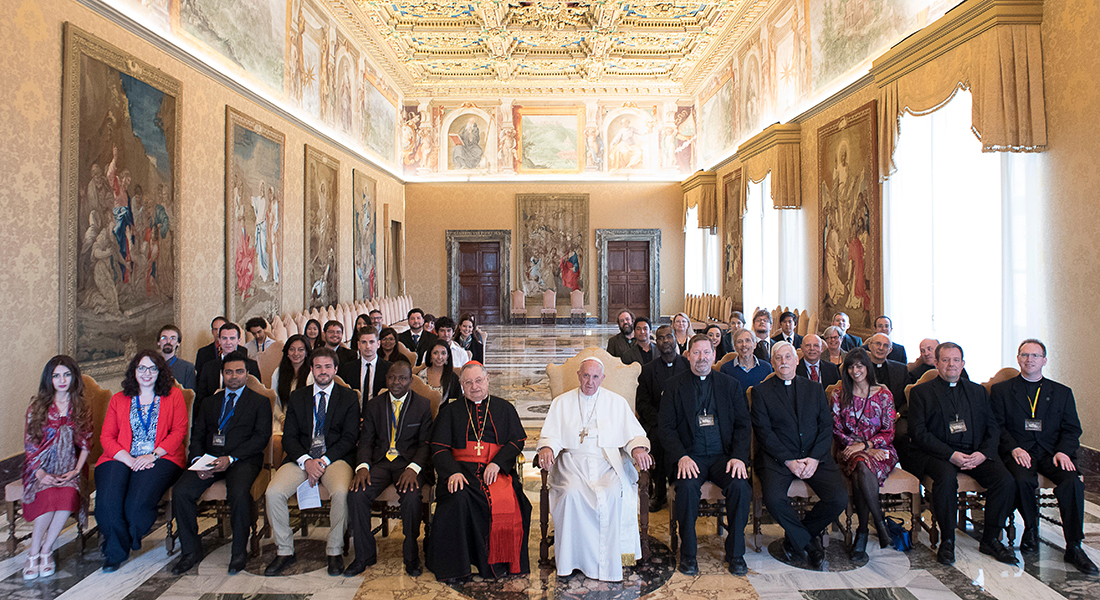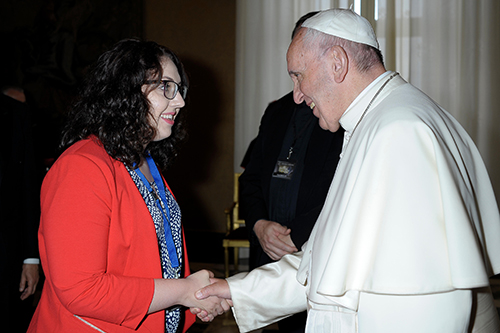
The Vatican Observatory Summer School is held in Italy at the Vatican Observatory headquarters and runs every two years, with varying topics. The 2016 topic was "Water in the Solar System and Beyond" and was attended by master's student Cosette Gilmour (front row, second from left).
I have been at the U of A for the past 6 years where I began my education studying geology in the Earth and Atmospheric Sciences department. After obtaining a BSc with Honors degree in Geology, I continued on to start my MSc degree, working with Dr. Chris Herd. My master's project is an evaluation of the economic potential of asteroids for mining using meteorites as asteroid analogues. To do this, I study the concentration of precious metals and water abundances in meteorites. One of my projects involves evaluating the degrees of aqueous alteration among different samples of the Tagish Lake meteorite from the amount of water they contain.
I was first introduced to the Vatican Observatory Summer School by my supervisor. The school is held in Italy at the Vatican Observatory headquarters and runs every second year, with varying topics. This year's topic was "Water in the Solar System and Beyond". Given that one of my projects falls directly into this category, my supervisor suggested I apply for the school.
"It's quite amazing how people from all over the world and different religions can come together and be unified by science."
There were 23 applicants selected from 19 different nations, and I was the only Canadian selected to attend the school. The great thing about the diversity of students was that everyone had different backgrounds; there were astronomers, astrophysicists, geologists, and engineers from all over the world studying very different things about water in the solar system. Not only were we being exposed to all these different scientific backgrounds, we were also learning about each other's cultures and that was an experience in itself.
I learnt so much attending this school and my understanding of the water in the solar system and beyond has certainly increased. The school touched on water in every aspect imaginable from the planets and their satellites, asteroids, meteorites, and even stellar formations and extraterrestrial life. You really become specialized when you are working on a master's thesis, and I would have never branched out to learn the things I did attending this school otherwise.
I have all this new information that I can apply to my thesis, and that's invaluable. Part of this school's program was also to gain hands on experience by working on projects. There were many to choose from, and I selected a project that involved determining asteroid types from their photometric colours and spin rates. This is something completely out of my field of study as it is an aspect of astronomy, but it was such an incredible experience being thrown into something I had barely any background on and present my findings. In my opinion this is one of the best ways to learn something new.
 One of the highlights of this school was that we had the opportunity to meet Pope Francis. This experience was like no other. The moment the Pope walked into the room I had this moment of disbelief because it didn't seem real. People like me do not get to meet the Pope every day, yet here I was. There is no better way to sum up his views on science and religion better than in his own words he used in his address [Address of Pope Francis to participants in the summer course of the Vatican Observatory]; I can however say that one of the highlights for Pope Francis is meeting young scientists.
One of the highlights of this school was that we had the opportunity to meet Pope Francis. This experience was like no other. The moment the Pope walked into the room I had this moment of disbelief because it didn't seem real. People like me do not get to meet the Pope every day, yet here I was. There is no better way to sum up his views on science and religion better than in his own words he used in his address [Address of Pope Francis to participants in the summer course of the Vatican Observatory]; I can however say that one of the highlights for Pope Francis is meeting young scientists.
When I got up to shake the Pope's hand, the moments leading up to the hand shake happened so fast. But the second I shook his hand, I felt this sense of calm, warmth, and security that I have never felt before. You could see the sincerity and compassion in his eyes, and once the hand shake was over, I felt a natural high from all the excitement and being in his presence. He is truly a remarkable man. It's quite amazing how people from all over the world and different religions can come together and be unified by science. It was truly an unforgettable experience.
-Cosette Gilmour